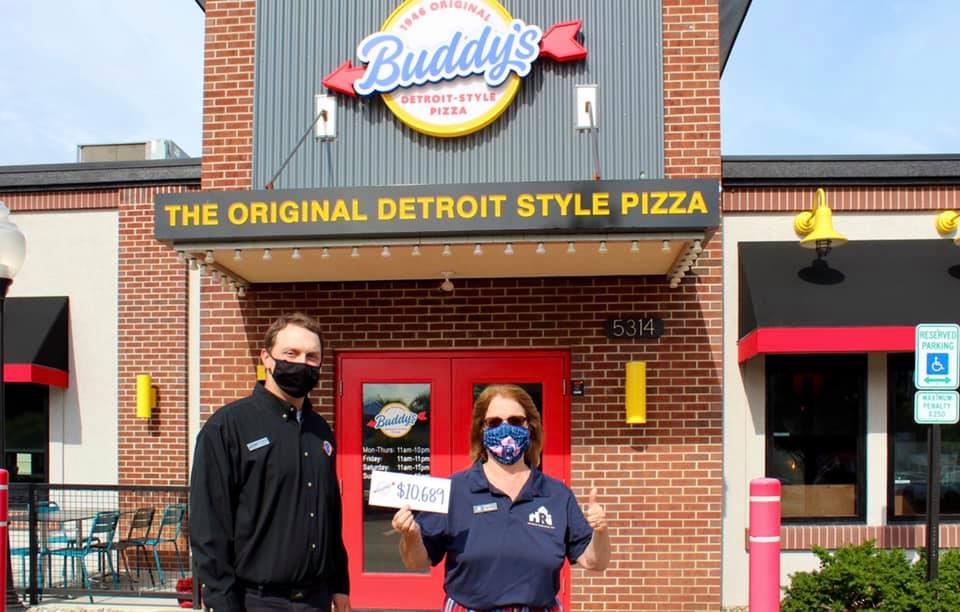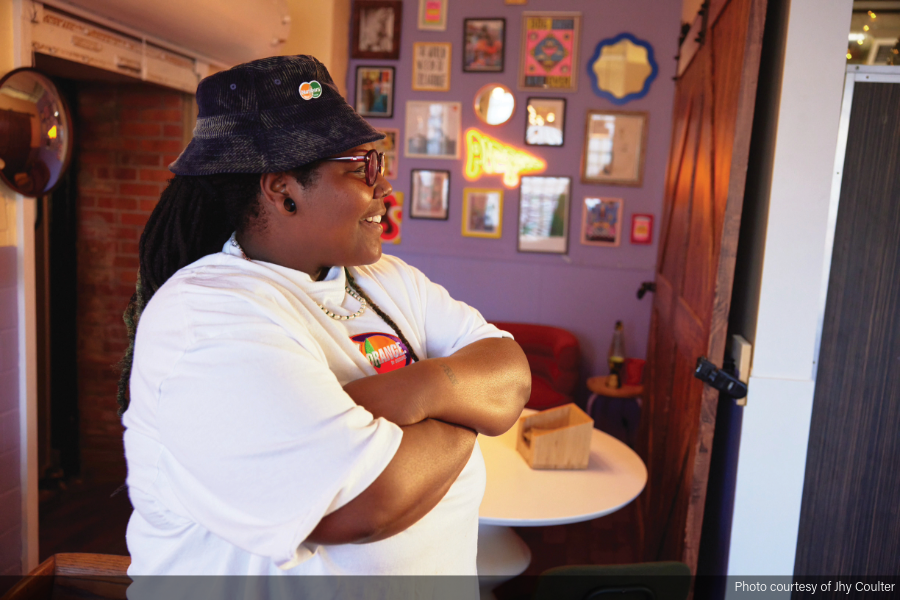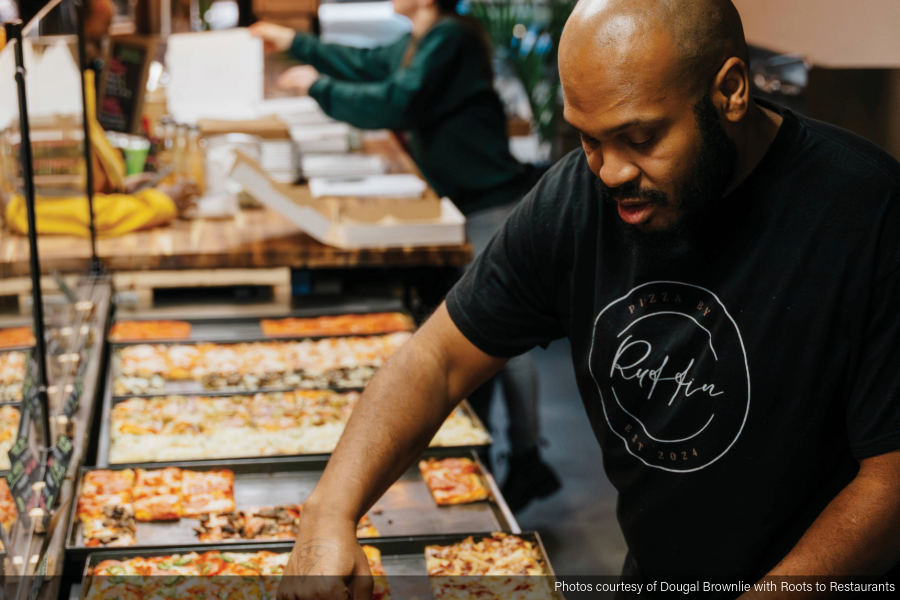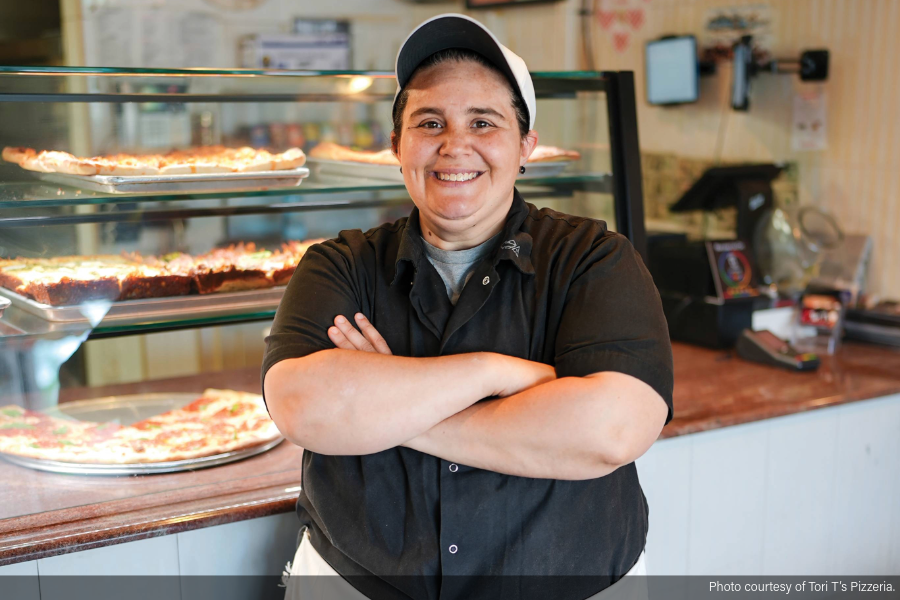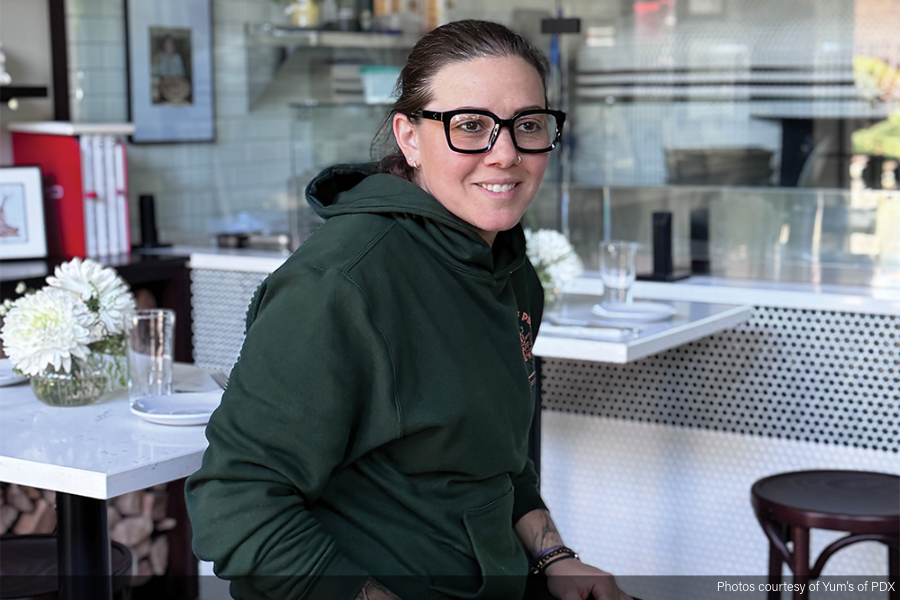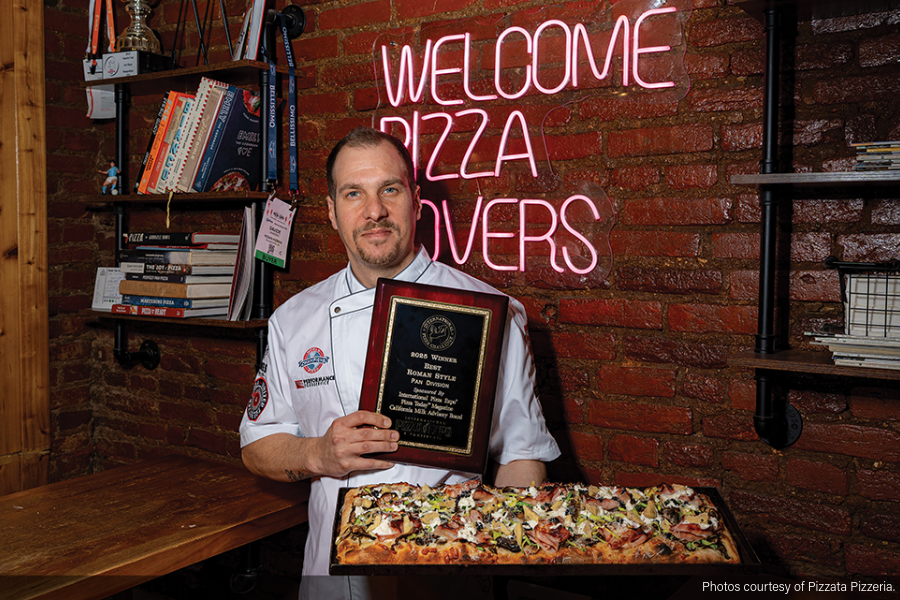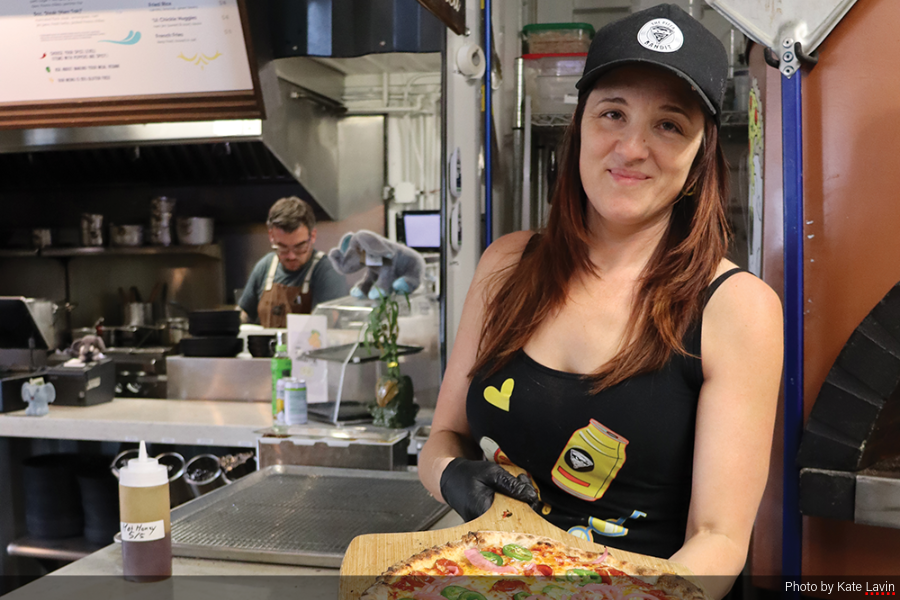Continued — More firsthand accounts of how pizzeria owners and leadership have handled the COVID-19 Pandemic (Page 4)
MORE COVID-19 STORIES: Page 2 | Page 3 | Page 4 | Page 5 | Back to Main Page
DoubleDave’s Pizzaworks
Tackling The Pandemic Peace by Piece — The arrival of COVID-19 to the United States in early 2020 has caused significant issues for the restaurant industry. From the plants producing ingredients to the employee making our pizzas, our world has been rocked to its foundation. Thankfully, our industry has been shielded more than most due to the comfort of pizza at home and the ease of delivery and takeout of our products. For DoubleDave’s Pizzaworks to not only survive but thrive, we needed to look at many of our processes and change to stay effective.
We started with our most important priority: our team. We talked with our staff about COVID-19 to discuss what we knew, how we would move forward to make their work environment safe and secure, and how we were responsible for keeping our guests as safe as possible. By wearing masks, increasing our sanitation schedule, closing our dining rooms, installing plexiglass barriers for cashiers, and conducting daily health checks, we set the expectations for safety. We also made a focus with our franchisees to keep everyone’s mental health at the forefront. For many, this has been an anxiety-filled time working as essential employees, and we worked hard to remind them that each person is valuable to the team and that their health/mental well-being came first.
Next, we focused on our ingredients. Supply chain issues across the US have caused many interruptions in producing key ingredients and transportation to our warehouses/restaurants. We worked with our key distributors to add additional safety stock for all our essential items (dough, meat, sauce, cheese, proteins, boxes). While most of our vendor partners did their best to keep their products moving at a regular pace, problems did occur, such as reduced plant capacity, missed purchase orders, and temporary outages. This safety stock we created has helped us soar over these challenges.
Finally, we honed in on our strengths. We’ve been successfully executing the pickup/delivery model for over 35 years. However, it was imperative that we not only do our jobs well but also adapt and improve to serve the new normal. We instituted Curbside Pickup and Contactless Delivery, improved our delivery platform with GPS tracking for delivery drivers, tested text-based communication with our customers, updated our website, and pushed for increased overall communication and feedback. Menu changes also took place, such as eliminating low selling items and adding comfort items like ice cream pints. Adaptation is the only way that restaurants can survive in today’s environment, and we’re here for it.
2020 will be one for the record books. DoubleDave’s is proud to have weathered the storm and come out stronger on the other side. To date, we have not lost one location.
Instead, we opened a new powerhouse in the San Antonio market. We’re proud of our employees, our franchisees, and our vendor partners for their determination, patience, and willingness to adapt.
We look forward to the day where COVID-19 will be a distant memory. Until then, we’re ready to provide our best slice to help out our communities…Peace by Piece.
View DoubleDave’s whole Tackling the Pandemic Peace by Piece presentation.
Buddy’s Pizza — Detroit, Michigan
Phase One – Reactive Adaptations
In March, Michigan’s governor instituted a Stay Home, Stay Safe Executive Order, closing all indoor dining for the foreseeable future. At Buddy’s Pizza, creator of the original Detroit-Style pizza, 70 percent of sales came from dine-in visits, so quickly adapting the company’s service model to adhere to the executive order while still servicing customers was vital for sustaining business.
Business Adaptations
Buddy’s immediately reimagined its carry out model for efficiency, in preparation for a high volume of orders. The restaurant immediately began offering curbside carry out, with an assigned team member monitoring for incoming customers. Additionally, for the first time in its 74-year history, the company implemented online ordering and a no-contact payment method.
Since Buddy’s does not offer native delivery, the restaurant made ordering food more accessible by offering free delivery through DoorDash.
Health & Safety
To keep all employees and customers safe, Buddy’s immediately put extensive health and safety measures in place, adhering to all CDC guidelines, including:
- All staff members wearing gloves and a mask at all times.
- Social distancing between each team member.
- Weekly, professional sanitation of each location.
- An assigned team member responsible for cleaning surfaces every 20 minutes.
- Taking employees’ temperatures before starting each shift.
- Anyone who was in contact with an individual who tested positive for COVID-19 would take a mandatory two-week paid leave to quarantine.
 With these measures in place, it was important Buddy’s communicated all protocols to its customers, giving them peace of mind when ordering from the restaurant. The company included all details in media materials, on the website, emails and on all social media channels.
With these measures in place, it was important Buddy’s communicated all protocols to its customers, giving them peace of mind when ordering from the restaurant. The company included all details in media materials, on the website, emails and on all social media channels.
Additionally, Buddy’s provided frequent internal communications from CEO Burton Heiss and store managers to keep all employees updated on operations and health/safety protocols.
For those who remained working, the team increased pay and offered extra paid time off. Leadership provided complimentary meals to all workers, including those who opted to take a temporary leave.
Community Initiatives
With community members working on the frontlines during the pandemic, Buddy’s wanted to create a special way to thank them. In April, Buddy’s launched its Feed the Frontliners initiative (becoming what the company believes was the first frontliners initiative created by a restaurant group in Michigan), giving all healthcare workers and first responders 50 percent off their entire order. In six weeks, Buddy’s donated more than $100,000 in free and discounted meals to those working on the front lines.
Buddy’s immediately received an influx of requests from customers, offering to donate money to support this program. The team then launched its second phase of the initiative, allowing guests who ordered online the option to add a Hero Pie to their order for $20, which helped cover the costs of meals for frontline workers. Buddy’s also invited the community to visit the Buddy’s website and nominate a public service organization that was working the frontlines. The company delivered meals to hospitals, police stations and fire stations and other frontline businesses.
Carry Out-Only Grand Opening
Leading up to the Stay Home, Stay Safe Executive Order, the Buddy’s team was in the process of opening its newest location in west Lansing, Michigan, originally scheduled for mid-March. While the team planned a robust grand opening celebration, including the first 100 people through the door receiving free pizza for one year, the team immediately shifted gears planning for a carry out-only opening and implementing all new health and safety protocols at the location, which pushed back the opening date. The company immediately began training staff at the Lansing location on how to perfect new protocols to keep everyone safe. Once everyone was fully trained on the operations and procedures, a new opening date was set.
To keep the community involved and to reward them for the extended wait to open, Buddy’s shifted its free pizza for one year initiative, making the whole program virtual. Buddy’s invited Lansing community members to sign up to be entered to become a Very Important Buddy (VIB). The team then chose 100 individuals at random to receive free pizza for one year. The adaptations made the west Lansing opening one of Buddy’s most successful openings to date and allowed the restaurant to donate more than $14,000 of its opening-day sales to a local hunger and homeless nonprofit shelter.
Phase Two – Opening at 50 Percent Capacity
When Michigan’s governor lifted the Stay Home, Stay Safe Executive Order in June, Buddy’s shifted its service operations yet again. Allowing in-store dining at 50 percent capacity after 2.5 months meant the company was entering a new phase of the global pandemic.
Health and Safety
In addition to safety measures implemented during phase one, Buddy’s executed additional protocols for in-store dining, including:
- Closed tables to allow for 6 ft of distance between parties.
- Employees wearing masks at all times.
- Guests wearing masks unless seated at their table.
- Single-use cutlery and menus.
- Relocated the hostess stand outdoors and began waitlists that allowed customers to wait in their cars to control restaurant traffic.
Marketing Initiatives to Drive Sales
 The biggest obstacle Buddy’s faced was how to drive foot traffic inside restaurants. To incentivize in-store dining, the restaurant launched a series of marketing initiatives including driving awareness of patio seating, summer holiday deals, discounts during off-peak hours, all-day happy hour specials, back to school deals for teachers and more.
The biggest obstacle Buddy’s faced was how to drive foot traffic inside restaurants. To incentivize in-store dining, the restaurant launched a series of marketing initiatives including driving awareness of patio seating, summer holiday deals, discounts during off-peak hours, all-day happy hour specials, back to school deals for teachers and more.
To get word out about the marketing initiatives, Buddy’s used a combination of owned and earned media. With a large portion of its customer base made up of families, Buddy’s also partnered with parenting bloggers in all markets to conduct gift card giveaways and promote the various deals to further reach this specific audience.
50% Dine-In Capacity Grand Opening
The next focus was opening a new restaurant in Portage, Michigan – the second opening amid the pandemic. While the restaurant would open at 50 percent dine-in capacity, the obstacle remained the same – maintaining and communicating health and safety measures. To ensure the community was aware of all precautions, the team included its safety messaging on all external marketing channels.
Like Lansing, Buddy’s kept the Portage VIB program virtual, giving the community a chance to win free pizza for one year. The Portage location offered the same services implemented at all other restaurants, including curbside carry out, no-contact payment, socially distanced indoor seating and more.
Being part of and supporting the communities they operate in is one of Buddy’s company core values. They did this in Portage by forming a partnership with a local housing resource organization that not only had ties to Portage, but throughout the county, allowing the donation of all opening sales to reach even more people in the community.
Phase Three – The New Normal & Future Plans
 As proven throughout 2020, nothing is certain. Buddy’s has continued to maintain the highest level of health and safety services for its team and communities. Open communication is at the forefront of all efforts, as the team recognizes this as a direct line to customers.
As proven throughout 2020, nothing is certain. Buddy’s has continued to maintain the highest level of health and safety services for its team and communities. Open communication is at the forefront of all efforts, as the team recognizes this as a direct line to customers.
As everyone acclimates to the new normal and state-mandated changes based on fluctuations in virus cases, Buddy’s will continue to uphold the following protocols:
- Specific tables closed to allow for 6 ft of distance between customers.
- Employees wearing masks at all times.
- Guests wearing masks unless seated at their table.
- Single-use cutlery and menus.
- Keeping the hostess booth outdoors (weather permitting) to control restaurant traffic.
- All staff members wearing gloves and a mask at all times.
- Social distancing between each team member.
- Weekly, professional sanitation of each location.
- An assigned team member responsible for cleaning surfaces every 20 minutes.
- Employee temperatures taken before starting each shift.
- Anyone who was in contact with an individual who tested positive for COVID-19 will take a mandatory two-week paid leave to quarantine.
- Offering curbside carry out.
- No-contact payment methods.
- Delivery through DoorDash
Looking Ahead
As state regulations consistently change, the Buddy’s team is looking ahead. They are currently planning to launch a new catering and loyalty program. In-person gatherings are limited to 10 or less in the areas where Buddy’s has restaurants, so their normal catering promotion has shifted to accommodate and highlight smaller gatherings and offerings. However, sign-ups in their new loyalty app are rising steadily with no paid or earned promotion, strictly thanks to mentioning the program to in-store and carry out customers, with more than 3,400 sign-ups generated in three weeks. The Buddy’s team is also preparing to open its third location during the pandemic to round out the year.
To continue momentum and finish the year strong, the Buddy’s team will be using its legacy promotions, along with new ideas and promotions, to generate sales through Q4 and into 2021. Promotions for Halloween and the holidays will be adjusted for 50 percent dine-in capacity and carry out Michigan’s governor has not announced a timeline for returning to full dine-in capacity.
— Vice President of Growth Katy Dean
Andolini’s Pizzeria — Tulsa, Oklahoma
Watch as Owner Mike Bausch details what has happened at Andolini’s Pizzeria in Tulsa, Oklahoma since the COVID-19 Pandemic began in March.
Old Chicago Pizza & Taproom — (81 units) Boulder, Colorado
Old Chicago Pizza & Taproom has had quite a year. The previous parent company, Craftworks Holdings, filed for bankruptcy early March, right before the pandemic broke out. On June 1, 2020, SPB Hospitality, an affiliate of Fortress Investment Group LLC, became the new owner of the Old Chicago brand. Restructuring a brand out of bankruptcy presents its own set of obstacles. Add in a global pandemic that has been catastrophic for the restaurant industry and the recovery becomes even trickier. Yet, these challenges have brought new inspired new levels of excitement and commitment from the Old Chicago team who is determined to not only survive the rest of the year, but also prepare for a monumental 2021.
While Old Chicago had to unfortunately furlough a portion of the workforce at the beginning of the pandemic, they were able to bring back many employees to help reopen the remaining 81 Old Chicago locations and start the process of revitalizing the Colorado-based brand.
Like all restaurant concepts, we had to shift our Old Chicago strategy to cater to reach consumers through off-premise channels, as well as streamline our menus to improve margin and efficiencies. We have continued to see success and increased sales in these revenue streams, especially through delivery. Pre-COVID-19, delivery accounted for 7.5% of total sales. Now, it’s about 25%.
Now that Old Chicago is back and better than ever, we can focus on what we do best: serving craveable, handcrafted pizzas that are perfectly paired with local and legendary brews from down the street and around the world.
Amici’s East Coast Pizzeria — San Mateo, California
Like most other pizza restaurants, we already were geared to handle more pick-up and delivery sales — even though we’re a full-service restaurant with upscale dining rooms.
One decision we made was to take advantage of greatly reduced advertising rates to help us build and reinforce our brand.
In addition we recently signed two leases to add ghost kitchens within CloudKitchens locations.
— President Peter Cooperstein
MORE COVID-19 STORIES: Page 2 | Page 3 | Page 4 | Page 5 | Back to Main Page
